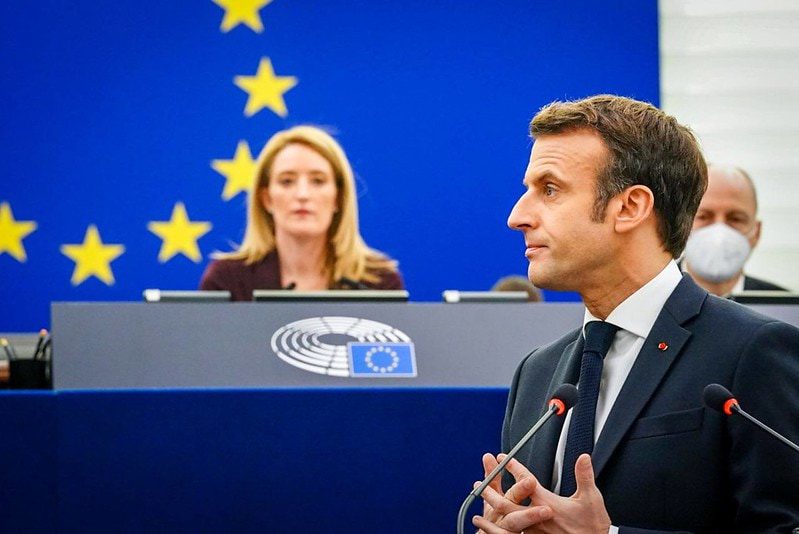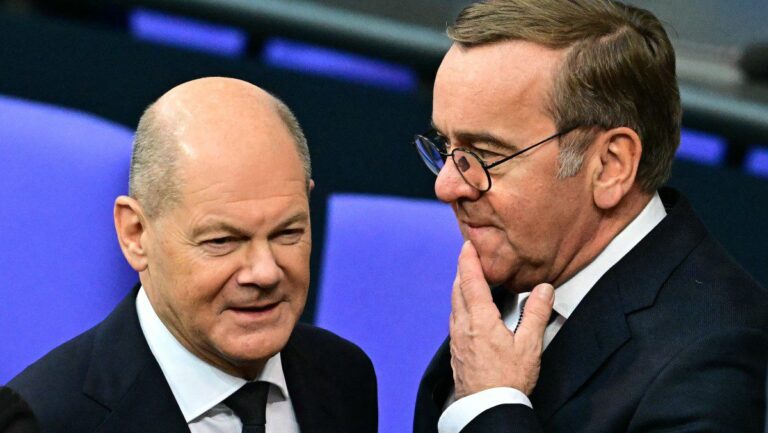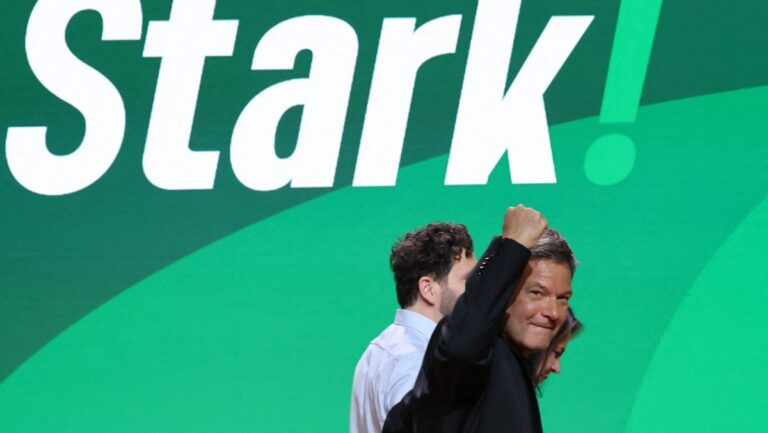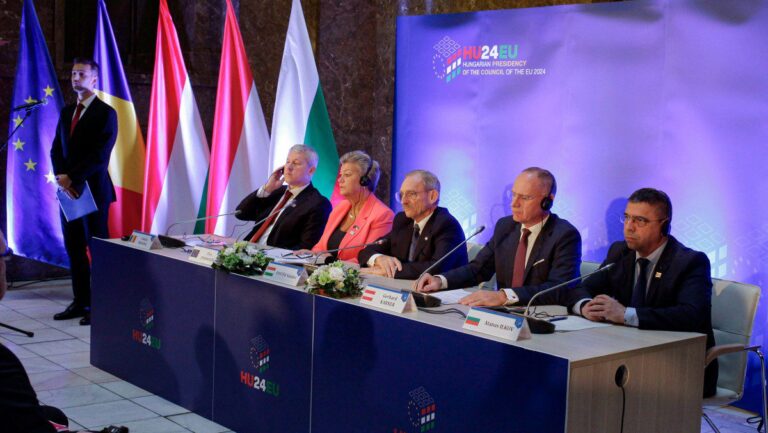On Wednesday, January 19th, French President Emmanuel Macron gave a programmatic speech to members of the European Parliament in Strasbourg.
Macron was welcomed on his arrival by the newly elected President of the Parliament Roberta Metsola. Opponents greeted his arrival with boos.
His 30-minute speech outlined his ambitions for the six-month French presidency of the European Union. With the French presidential election due to take place during those six months, it is possible that it will no longer be Emmanuel Macron who represents France at the end of that period.
Emmanuel Macron emphasized his Europeanism by delivering his speech thematized as l’évidence européenne, or “obviously Europe.” He outlined his program in his first speech, and deepened the main points in the exchange that followed with the MEPs.
LIVE | Watch the speech by French President @EmmanuelMacron in the plenary session of the @Europarl_EN followed by a discussion with MEPs during #EU2022FR https://t.co/gI3Z47wDR6
— Présidence française du Conseil de l’UE 🇫🇷🇪🇺 (@Europe2022FR) January 19, 2022
Macron stated his desire to see the right to abortion and the protection of the environment included in the Charter of Fundamental Rights of the European Union. While the issue of extending the legal deadline for abortion is currently being debated in the French Senate, Emmanuel Macron wanted to send a signal in the form of a warning to the new president of the European Parliament, who is vigorously attacked in France for her anti-abortion position. His statement is a signal of support to critics of Renew, the European parliamentary group to which La République En Marche (LREM) belongs and who supports Metsola. It is primarily a symbolic proposal, as the Charter of Fundamental Rights is not easily amended, and abortion does not fall within the scope of the European Union’s competences.
On the geopolitical level, he reiterated his willingness, already expressed in December, to reform the Schengen area, without however saying more about the main lines of this announced reform. He spoke in favor of a renewed dialogue with Russia, a dialogue that he hopes will be “frank” and “demanding,” although the sanctions to which Russia is still subject went unmentioned. He advocated a “new security order” facilitated by NATO, again without going into concrete details. In his interview with the deputies, he then emphasized the need for energy independence from Russia.
Emmanuel Macron reiterated his desire to move forward in the integration process of the Balkan countries. He also wants to see Bulgaria, Romania, and Croatia enter the Schengen area.
Emmanuel Macron defended the idea of a constructive dialogue with Hungary and Poland, recalling the fact that these states are full members of the European Union:
I am surprised that anyone would be reproached for signing agreements with countries like Poland and Hungary. In this case, stop the European Union immediately or exclude them. We can have a dialogue, disagreements, and assume to have disagreements, but our legitimacy requires us to continue to move forward on the rest of the agenda; it is the very functioning of our Europe.
This apparent outreach did not prevent him from holding Poland accountable for the €1 million fine, nor from denouncing the drift of some states that are tempted, according to him, to a return to “authoritarian regimes” that undermine the rule of law. Macron’s denunciation was teeth cringing, given the restrictions currently in force in France. The president, in fact, had to defend himself on this subject in response to attacks by the Estonian MEP Jaak Madison and the Croatian MEP Mislav Kolakušić. He refused to acknowledge “the confusion” pointed out by them, not recognizing the contradiction in infringements on the rule of law on the Old Continent and his own management of the pandemic.
On the political level, he spoke in favor of the right of legislative initiative for the parliament in order to strengthen the power of this representative institution.
During the question-and-answer session, the exchanges were particularly lively with French deputies representing the different currents of opposition to the president’s party.
The ecologist Yannick Jadot, who is also a presidential candidate, was the first to speak and he attacked the French president with virulence. He accused him of weakness on the issue of global warming, and of complacency towards Hungary and Poland, who he accuses as guilty of “climaticide”—a curious reproach, as ecology is not really part of the contentious issues between France and these two countries of Eastern Europe. Yannick Jadot’s attack was mainly intended to mark his disapproval of the migration policies of Warsaw and Budapest. Criticism also came from Manon Aubry representing the left-wing party La France Insoumise (LFI), who openly blamed Emmanuel Macron’s party for supporting Metsola.
Emmanuel Macron displayed his ambition to promote European civilization and its culture, through a “common project respectful of the singularities and identities of each [nation].” To do this, historians and intellectuals must help “build together the legacy of this common history.” In the exchange with the deputies, he recalled that he has never been opposed to promoting the Christian roots of Europe. The deputy Jordan Bardella of the Rassemblement National nevertheless attacked him violently in these terms: “Your Europe is 60 years old, ours is 3,000! You have made Europe the backyard of Washington, the prey of Beijing, the doormat of Erdogan, and the hotel of Africa.” The argument was violent, and Emmanuel Macron, in return, accused the MEP of “methodically saying nonsense.”
Faced with the overly animated nature of the debates, the president Roberta Metsola had to remind the interlocutors that the hemicycle was not “the place for the presidential campaign.” A few moments earlier, Belgian MEP Guy Verhofstadt had mocked the French MEPs who had taken advantage of this forum to campaign for the presidential election.
The exchange with the MEPs lasted more than four hours, much longer than initially planned. The press conference that was supposed to take place afterwards was canceled and reporters were given statements, without opportunity to field questions. In protest, the European journalists left the room before it began, noted the correspondent of France Televisions.
The Belgian press was very critical of Macron’s speech and accused him of parasitizing the event for campaign purposes instead of addressing European concerns. The German press, on the other hand, welcomed the resolutely Europeanist profile of the French president. For Hungary and Poland, the French presidency will be an opportunity to see which European model will prevail, between the one defended by France and the one defended by the countries of Eastern Europe.





